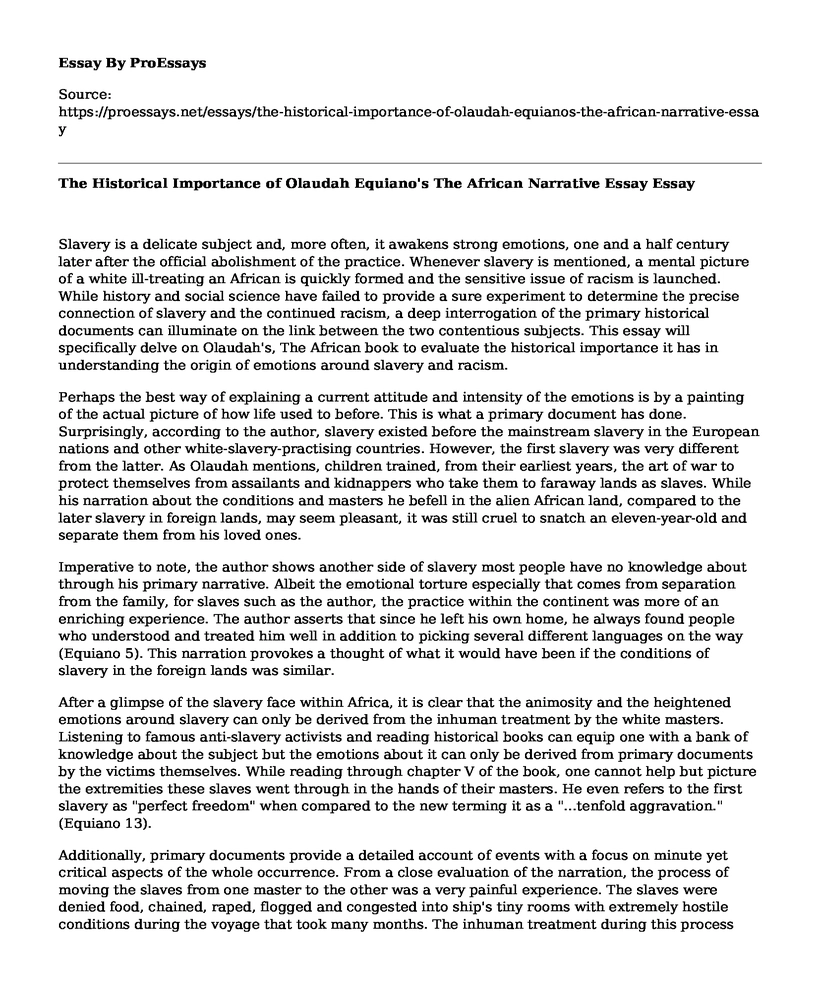Slavery is a delicate subject and, more often, it awakens strong emotions, one and a half century later after the official abolishment of the practice. Whenever slavery is mentioned, a mental picture of a white ill-treating an African is quickly formed and the sensitive issue of racism is launched. While history and social science have failed to provide a sure experiment to determine the precise connection of slavery and the continued racism, a deep interrogation of the primary historical documents can illuminate on the link between the two contentious subjects. This essay will specifically delve on Olaudah's, The African book to evaluate the historical importance it has in understanding the origin of emotions around slavery and racism.
Perhaps the best way of explaining a current attitude and intensity of the emotions is by a painting of the actual picture of how life used to before. This is what a primary document has done. Surprisingly, according to the author, slavery existed before the mainstream slavery in the European nations and other white-slavery-practising countries. However, the first slavery was very different from the latter. As Olaudah mentions, children trained, from their earliest years, the art of war to protect themselves from assailants and kidnappers who take them to faraway lands as slaves. While his narration about the conditions and masters he befell in the alien African land, compared to the later slavery in foreign lands, may seem pleasant, it was still cruel to snatch an eleven-year-old and separate them from his loved ones.
Imperative to note, the author shows another side of slavery most people have no knowledge about through his primary narrative. Albeit the emotional torture especially that comes from separation from the family, for slaves such as the author, the practice within the continent was more of an enriching experience. The author asserts that since he left his own home, he always found people who understood and treated him well in addition to picking several different languages on the way (Equiano 5). This narration provokes a thought of what it would have been if the conditions of slavery in the foreign lands was similar.
After a glimpse of the slavery face within Africa, it is clear that the animosity and the heightened emotions around slavery can only be derived from the inhuman treatment by the white masters. Listening to famous anti-slavery activists and reading historical books can equip one with a bank of knowledge about the subject but the emotions about it can only be derived from primary documents by the victims themselves. While reading through chapter V of the book, one cannot help but picture the extremities these slaves went through in the hands of their masters. He even refers to the first slavery as "perfect freedom" when compared to the new terming it as a "...tenfold aggravation." (Equiano 13).
Additionally, primary documents provide a detailed account of events with a focus on minute yet critical aspects of the whole occurrence. From a close evaluation of the narration, the process of moving the slaves from one master to the other was a very painful experience. The slaves were denied food, chained, raped, flogged and congested into ship's tiny rooms with extremely hostile conditions during the voyage that took many months. The inhuman treatment during this process could easily be overlooked by the secondary sources yet they play a vital role in shaping the attitudes and emotions of the slaves. Furthermore, the author shows another divide of masters that extruded nobleness and humanity in their dealings. As it can be seen from the document, Mr Robert King, the last master, treated his slaves with kindness, converse to others. The narrative illuminates on the difference in values and tolerance of inhuman treatment by slave masters that is easily overlooked yet important in understanding why some white supported the abolishment.
Conclusion
As seen, the current attitudes and heightened emotions around the subjects of slavery and racism are deeply rooted in the minute inhumane events that are hard to comprehend when given through the secondary sources. The primary document gives the reader an opportunity the get a glimpse of a vivid picture of a historical phenomenon and understand the subject better.
Work cited
Equiano, Olaudah. The Interesting Narrative of the Life of Olaudah Equiano; Or Gustavus Vassa, the African. W. Cock; and sold by his agents throughout the kingdom, 1815.
Cite this page
The Historical Importance of Olaudah Equiano's The African Narrative Essay. (2022, Jul 01). Retrieved from https://proessays.net/essays/the-historical-importance-of-olaudah-equianos-the-african-narrative-essay
If you are the original author of this essay and no longer wish to have it published on the ProEssays website, please click below to request its removal:
- Essay on Who Was the Dark Lady of the Sonnets?
- Literary Analyis Essay on Social Class and Status in The Great Gatsby
- Gorge Orwell's 1984 and Language Essay
- Tell-Tale Heart Compares to Scarlet Letter: Literary Analysis Essay
- The Development of the Characters in Homer's Iliad Essay Example
- Paper Example on Uncertainty of Events Unites Father and Son: Holocaust Facts
- Essay Sample on Exploring Egypt's Ancient Art & Architecture: A Historical Journey







